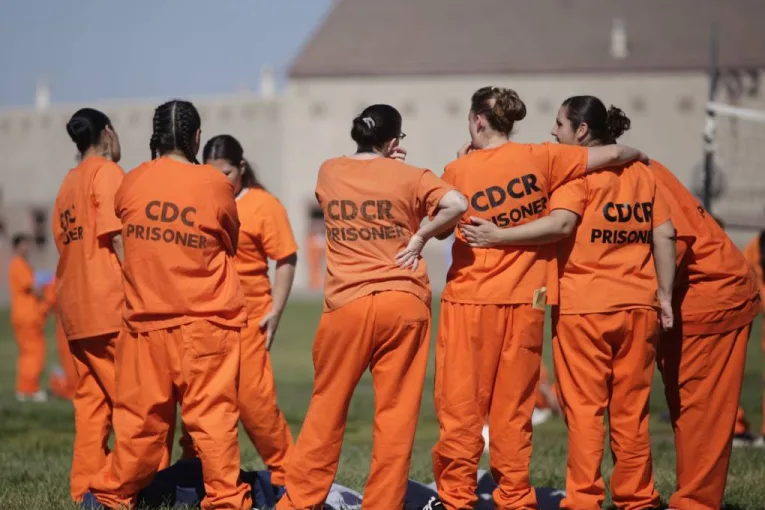
Photo caption: Incarcerated people stand together in a yard at Central California Women’s Facility in Chowchilla, Madera County. (Lea Suzuki/The San Francisco Chronicle)
By Betty Mills
Recently, California took a significant step towards equity and humane treatment within its correctional facilities by passing Assembly Bill 1810 through the Senate. This groundbreaking legislation, co-sponsored by the Los Angeles Regional Reentry Partnership (LARRP), addresses a fundamental yet often overlooked issue: access to menstrual products for incarcerated women.
For too long, the lack of adequate menstrual care in prisons has been a glaring injustice, reflecting broader systemic issues within the California Department of Corrections and Rehabilitation (CDCR). Menstruation is a natural biological process, yet for many women behind bars, managing it has been a persistent struggle. AB1810, co-sponsored by LARRP, seeks to rectify this by mandating that menstrual products be made available to incarcerated individuals at no cost.
But this bill is about more than just providing sanitary products; it’s about recognizing the dignity and basic human rights of incarcerated women. Historically, women in prison have faced significant barriers in accessing menstrual care, leading to distressing and unsanitary conditions. As a formerly incarcerated woman who experienced this firsthand, I can attest to the dehumanizing reality many women still face.
During my time in CDCR, menstrual care was a constant source of anxiety and humiliation. The state-issued “monthly allotment” of three tampons and three sanitary napkins was woefully inadequate. I remember the discomfort of having to request more supplies from male correctional officers, who often displayed a disturbing lack of sensitivity to our needs. These requests were sometimes met with ridicule or outright dismissal, forcing many of us to struggle with inadequate hygiene in an already challenging environment.
Addressing a Basic Human Need
AB1810 represents a crucial shift in addressing these inequities. The bill’s passage ensures that menstrual products will now be provided at no cost and made readily available—an essential change that acknowledges the basic dignity and health needs of incarcerated women. Menstrual care should never be a source of embarrassment or discomfort; it is a basic necessity, and it is the state’s responsibility to provide it. Now that our bill has passed out of the Legislature, we will turn our advocacy to Governor Newsom to ensure he signs the legislation we have all worked on this year into law.
The legislative success of AB1810 is a testament to the power of advocacy and the importance of representation. Assembly Members Bryan and Bonta have brought attention to a pressing issue that many might have otherwise overlooked. Their leadership, alongside the support of organizations like LARRP, has sparked a necessary conversation about the fundamental rights of incarcerated individuals and the state’s responsibility to ensure their well-being.
Setting a New Standard
The impact of AB1810 extends beyond the prison walls. It sets a precedent for how we approach corrections, highlighting the need for policies that consider the unique needs of women. This bill underscores the importance of policy reform that not only addresses immediate needs but also challenges the underlying inequities in the system.
Moreover, the passage of AB1810 could serve as a model for other states grappling with similar issues. This legislation offers a blueprint for addressing menstrual care in prisons nationwide, paving the way for more humane treatment standards across the country.
Looking Ahead
As we celebrate the passage of AB1810, we must recognize that this victory is just one step in an ongoing journey. While the bill represents significant progress, it is part of a larger movement toward systemic reform in the criminal justice system. Ensuring that incarcerated women have access to necessary menstrual products is vital for human dignity, but it is equally essential to continue advocating for broader reforms that address the many challenges faced by those within the prison system.
As an alumna of the LEADERS Training Academy at LARRP and now an employee of LARRP, I am proud to see our organization co-sponsoring impactful legislation like AB1810. I want to thank the LARRP policy team for allowing me to share my story and for amplifying the voices of countless other women in California’s carceral system. AB1810 is more than just a legislative measure; it reflects our collective values and commitment to justice. By addressing the basic needs of incarcerated women, California is making a moral statement and setting a standard for others to follow.
Let us remember that the passage of AB1810 is just one piece of the puzzle in our quest for a fair and equitable criminal justice system. This moment is something to be proud of, but it also reminds us of the ongoing work needed to ensure that all individuals, regardless of their circumstances, are treated with the respect and dignity they deserve.